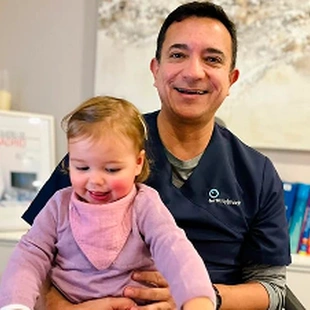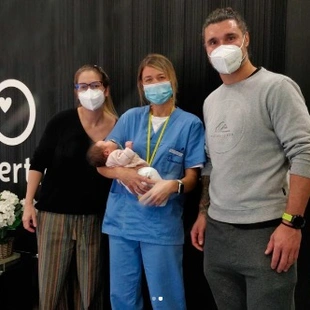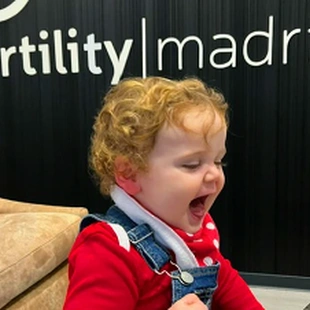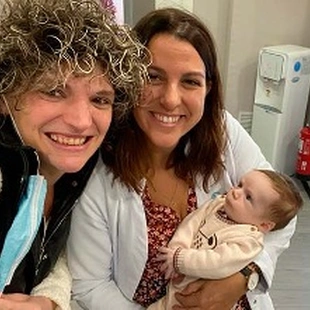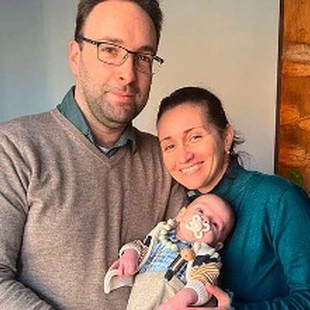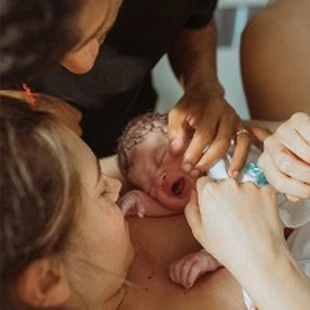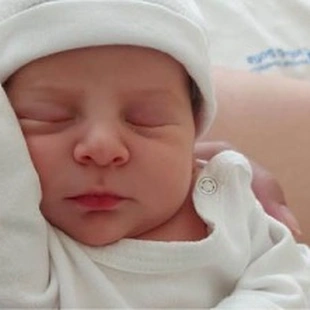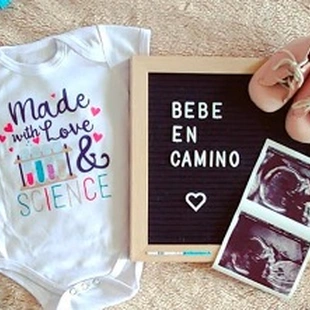ational average – SERF data 202: 34.8%
In Vitro Fertilisation (IVF) in Madrid
The most advanced and effective assisted reproduction treatment
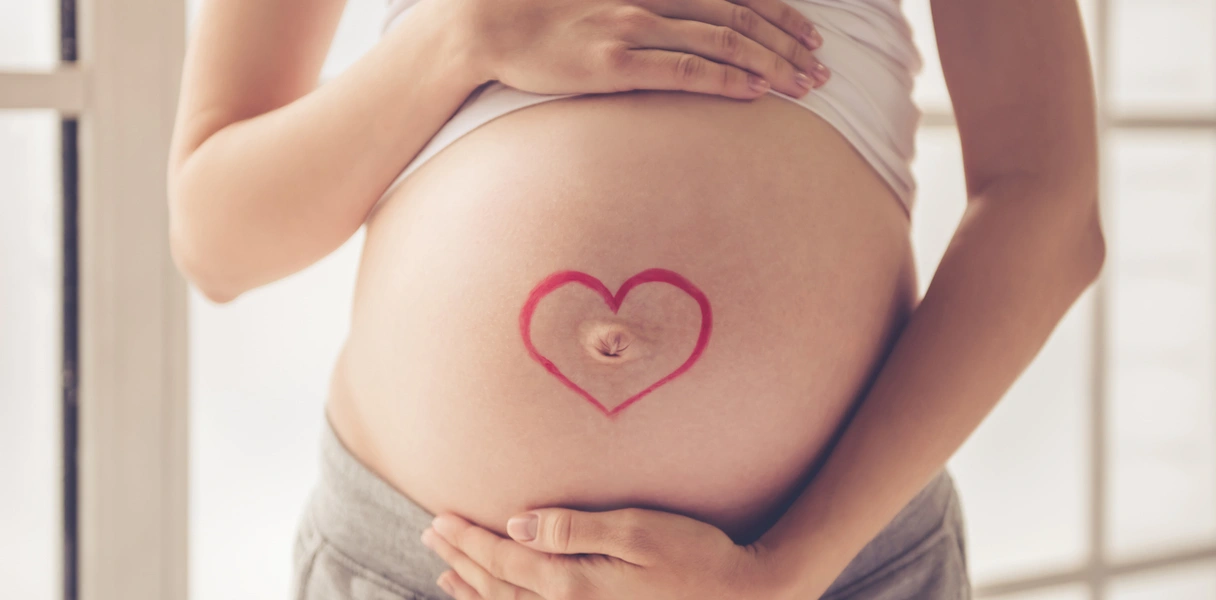
IVF Treatment Process
Once the plan is agreed, the treatment follows these steps:
Choosing the right IVF technique
We begin by selecting the method that best suits your needs. Currently, four options are available:
- IVF with your own eggs and your partner’s sperm
- IVF with your own eggs and donor sperm
- IVF with donor eggs and your partner’s sperm
- Double donation (both eggs and sperm from donors)
Ovarian stimulation
This uses hormonal medication to stimulate multiple egg follicles. Normally, only one egg matures naturally—but with medication, several follicles develop, providing more mature eggs.
Follicle retrieval
This is a simple procedure done under sedation in the operating theatre. The antral follicles are aspirated to retrieve the eggs.
Fertilisation of the eggs
In the IVF lab, embryologists locate the eggs in the follicular fluid. On the same day as retrieval (Day 0), the sperm sample (partner or donor) is prepared, and fertilisation occurs.
This can be done in two ways:
-
Conventional IVF, where egg and sperm unite naturally, or
-
ICSI (Intracytoplasmic Sperm Injection), where a single sperm is injected into each egg.
Embryo culture
After fertilisation, embryos are cultured in a Time-Lapse GERI incubator. This state-of-the-art incubator takes photos every 5 minutes, creating a time-lapse video—so we don't have to remove embryos for observation. Embryos develop in individual compartments for each patient and stay in culture for 3–6 days, depending on the case.
Embryo transfer
Once high-quality embryos are selected, either they are transferred to the uterus or vitrified. Transfers take place in the operating theatre—close to the lab—to protect embryo development. Typically, one or two embryos are transferred.
Spanish law allows up to three embryos, but we transfer no more than two, and only if the patient gives informed consent acknowledging the risks of twins. Otherwise, we strongly prefer transferring a single embryo to reduce multiple birth risks.
If there are remaining embryos, they are vitrified—freezing "biological time". These can be used in future cycles without ovarian stimulation; only endometrial preparation is needed.
Vitrification of remaining embryos
Sometimes, all of the embryos created, or the ‘remaining’ ones, are vitrified. In this way, we are able to stop the biological clock. These embryos can then be used in later cycles without the need to go through ovarian stimulation again.
In such cases, the only step required is to prepare the patient’s endometrium.
¿En qué casos está indicada la Fecundación in Vitro?
La Fecundación in Vitro (FIV) está mayoritariamente pensada para los siguientes casos:
Casos que afectan a la mujer
- Mujeres que presencien una obstrucción en las trompas de falopio
- Mujeres que contemplen alteraciones en su ovulación
- Mujeres que deseen tener niños/as sin pareja
- Mujeres afectadas por el trastorno de la endometriosis
Casos que afectan al hombre
- Hombres con una baja calidad tanto en la cantidad como en la calidad de sus espermatozoides
- Hombres infértiles o que han sido intervenidos con vasectomía
Casos que afectan a parejas
- Parejas homosexuales que desean tener hijos/as
- Parejas con cierto grado de esterilidad cuya procedencia es desconocida
Discover our patients' experiences
In Vitro Fertilisation (IVF) in Madrid
- Gynaecological consultations
- Gynaecological ultrasound scans
- Estradiol blood tests
- Egg retrieval (oocyte pick-up)
IVF Success Rates
Pregnancy rate at Fertility Madrid (IVF/ICSI)
Frequently asked questions about IVF
Is In Vitro Fertilisation safe?
IVF does not pose any risk to you or your baby. In addition, preimplantation genetic testing can be carried out to determine whether the sperm or eggs carry any genetic abnormalities, so that IVF is performed using cells free from any genetic problems.
What tests are necessary before IVF?
Before starting in vitro fertilisation, the following tests are usually carried out:
- Ultrasound scan
- Hormonal blood tests
- Viral disease screening
- Semen analysis
What happens if pregnancy is not achieved in the first IVF cycle?
If pregnancy does not occur after the first cycle, the following aspects are reviewed:
- Ovarian response
- Egg (oocyte) quality
- Proportion of mature eggs
- Embryo quality
This information helps guide the next treatment plan.
You can read more about possible causes of IVF cycle failure.
What are the success rates of IVF?
Find out more about the IVF success rates at Fertility Madrid.
What complementary tests or techniques are available in IVF?
One of the most well-known and effective techniques for ensuring a higher rate of healthy births is Preimplantation Genetic Testing (PGT).
PGT involves analysing the embryo’s genetic information to detect any abnormalities at an early stage. This test is particularly recommended for men or women with a personal or family history of genetic conditions.
At Fertility Madrid, we offer IVF (ICSI) + PGT, which includes a prior study of genetic and chromosomal alterations in embryos before implantation.
What are the advantages of IVF?
IVF offers multiple benefits, including the ability to overcome fertility problems in both men and women, the option to select embryos of higher quality, and the possibility of genetic testing before implantation to detect hereditary conditions.
Is IVF painful?
IVF itself is generally not painful, although some procedures—such as ovarian puncture (egg retrieval) and hormone injections—may cause temporary discomfort. Most patients describe these symptoms as similar to premenstrual syndrome.
How is ovarian stimulation carried out in IVF?
Ovarian stimulation is a crucial stage of IVF in which hormonal medication is used to encourage the ovaries to produce multiple eggs in a single cycle. This increases the chances of success by providing several eggs for fertilisation.
How long does ovarian stimulation last before egg retrieval?
Ovarian stimulation usually lasts around 10 days, depending on how the ovaries respond to the medication. During this period, ultrasound scans and blood tests are performed to adjust doses and schedule the retrieval.
What does egg retrieval involve?
Egg retrieval is a minimally invasive procedure carried out under sedation to collect eggs from the ovarian follicles. Using a fine needle guided by ultrasound, the eggs are extracted and prepared for fertilisation in the laboratory.
Is egg retrieval painful?
Egg retrieval may cause mild discomfort or abdominal cramps afterwards, but it is performed under sedation to minimise pain during the procedure. Most women can return to normal activities the following day.
How is fertilisation carried out in the laboratory?
Fertilisation in IVF takes place in the lab, where the retrieved eggs are combined with sperm. At Fertility Madrid, fertilisation is done by ICSI (Intracytoplasmic Sperm Injection), in which a single sperm is injected directly into an egg.
When is embryo transfer performed?
Embryo transfer usually takes place 3 to 5 days after fertilisation, once the embryos have reached the blastocyst stage. This allows us to select those with the greatest implantation potential.
How many embryos are usually transferred in IVF?
The number of embryos transferred depends on factors such as the woman’s age and embryo quality. At Fertility Madrid, we transfer a single embryo in more than 90% of cases, since this does not reduce success rates and avoids the risks of multiple pregnancy.
What are the signs of a successful embryo transfer?
Early signs may include light bleeding, abdominal bloating, and breast tenderness. However, the only definitive confirmation is a pregnancy test, usually carried out 10–12 days after transfer.
What risks or side effects can IVF have?
IVF is a safe treatment, though it may cause temporary side effects such as abdominal bloating, discomfort from stimulation, or, in rare cases, ovarian hyperstimulation syndrome. Serious complications are very uncommon.
What happens to embryos that are not used?
Embryos not transferred can be cryopreserved for future pregnancy attempts. There is also the option of donating embryos to other couples or for research purposes.
How long can frozen embryos be stored?
Embryos can remain frozen and viable for many years. The decision of when to use them depends on the couple’s reproductive plans.
When is it recommended to move from artificial insemination to IVF?
IVF is generally recommended after several failed attempts at artificial insemination, in older women, or in cases of severe male infertility.
Can IVF be carried out with donor eggs or sperm?
Yes. IVF can be performed with donor eggs or sperm if the patient’s own gametes are not suitable or if there is a risk of passing on a genetic disease.
